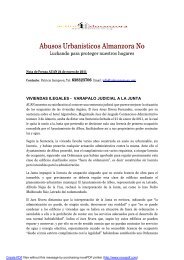European Property Rights and Wrongs - Diana Wallis MEP
European Property Rights and Wrongs - Diana Wallis MEP
European Property Rights and Wrongs - Diana Wallis MEP
Create successful ePaper yourself
Turn your PDF publications into a flip-book with our unique Google optimized e-Paper software.
The law was introduced at the start of the housing boom with the intention of<br />
preventing say one local farm owner from holding back the development of an<br />
area by refusing to sell l<strong>and</strong>, the balance of rights historically lying with the community<br />
rather than the individual. Unfortunately the law was not well drafted<br />
<strong>and</strong> allowed developers to take advantage of its terms to propose a development<br />
scheme over l<strong>and</strong> they did not own. They would then be able to legally take over<br />
inhabited l<strong>and</strong> in these areas with minimal compensation paid <strong>and</strong> a bill to the<br />
former l<strong>and</strong> owner for the installation of services such as street lighting which<br />
they did not want or need. This law was revised two years later <strong>and</strong> became the<br />
Ley Urbanística Valenciana (LUV) which did not address the central concerns of<br />
l<strong>and</strong> owners. A similar law was also in place in Andalucía with the same effects.<br />
Nationally, a re-prioritisation of environmental issues <strong>and</strong> planning for sustainability<br />
has led to a desire by Regional Governments to re-claim for the public<br />
<strong>and</strong> future heritage some of the coastal region <strong>and</strong> special rural places given<br />
over to rampant development in the 1980s <strong>and</strong> early 1990s in what is known as<br />
“urbanisation”. The painful process of finding a balance between public natural<br />
spaces <strong>and</strong> sensible urban planning has left many innocent victims in possession<br />
of homes that have been declared illegal, despite having been purchased with apparent<br />
full compliance. Sadly, criminal prosecutions <strong>and</strong> convictions of local public<br />
officials <strong>and</strong> developers continue to demonstrate that corruption in the real estate<br />
sector played a part in this picture. 5<br />
Bulgaria saw an unprecedented property boom when EU membership talks<br />
began in 2000, with six years of growth as an investment hotspot, <strong>and</strong> figures<br />
for 2005 showing 23 % of sales to foreign buyers <strong>and</strong> a capital price increase of<br />
37 %. 6 Most of the foreign buyers’ difficulties arose from properties purchased<br />
“off-plan”, i.e. not yet built, with a lack of sustainable infrastructure <strong>and</strong> uncertain<br />
<strong>and</strong> under-regulated planning, legal <strong>and</strong> sales advice. The majority of problem<br />
areas arose as a result of ambitious promises of large returns on investment<br />
for properties bought off-plan through aggressive marketing with oversupply <strong>and</strong><br />
the downturn in the market leading to many developments going bust <strong>and</strong> being<br />
left unfinished. In addition, the Pirin National Park became overdeveloped as a ski<br />
5 Transparency International Global Corruption Report 2009<br />
6 http://www.channel4.com/4homes/buy-sell/homes-abroad/country-region-guides/bulgaria-08-05-29<br />
12<br />
<strong>European</strong> <strong>Property</strong> <strong>Wrongs</strong>



